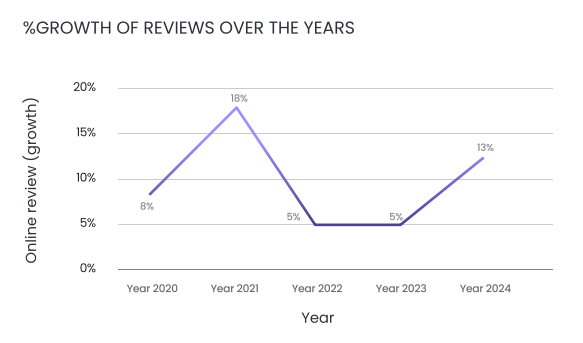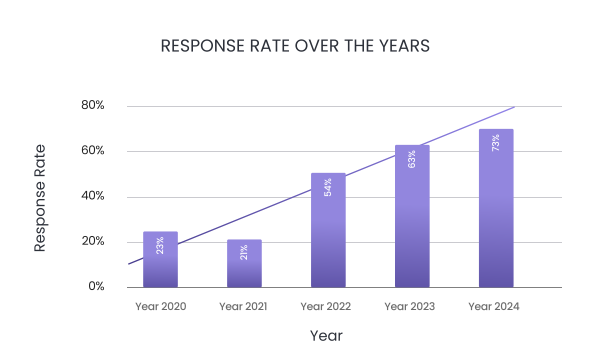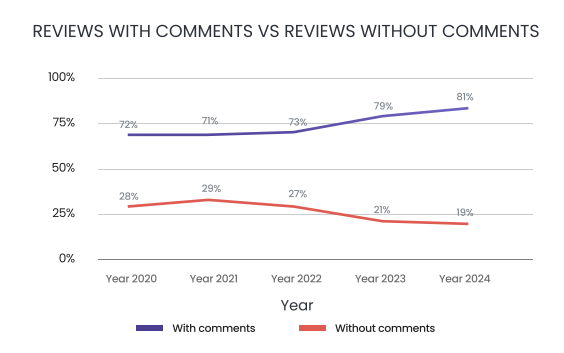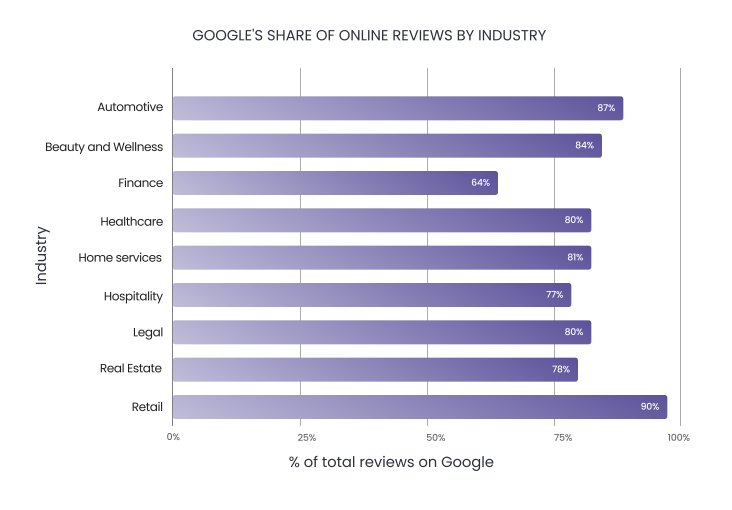
Last Updated on June 3, 2025 by Allen
Online Review Statistics 2025 Marketer’s Guide: What Online Review Stats Reveal About Consumer Behavior
In today’s hyperconnected marketplace, what determines whether a customer chooses your business or your competitor’s? According to our latest online review statistics 2025, the answer increasingly lies in what strangers say about you online.
Every day, millions of consumers turn to online reviews before making purchasing decisions—from choosing a restaurant for dinner to selecting a healthcare provider or deciding which car dealership to visit. These digital testimonials have evolved from helpful suggestions to essential decision-making tools that directly impact your bottom line.
Our 2025 Online Reviews report, which analyzes data from over 150,000 businesses across multiple industries and millions of customer interactions, reveals that online review data show dramatic shifts in how consumers provide feedback and how businesses must respond to maintain their competitive edge.
Let’s explore the most significant findings and what they mean for your business in 2025 and beyond.
Key Findings: Top Online Review Statistics at a Glance
- Review Volume Surge: Total review volume increased by 13% in 2024, reflecting consumers’ growing reliance on peer feedback.
- Google’s Continued Dominance: Google’s share of reviews climbed from 79% to 81%, solidifying its position as the primary platform for customer feedback.
- Review Request Acceleration: Businesses sent 25% more review requests in 2024, highlighting the strategic importance of gathering customer feedback.
- SMS Engagement Shifts: While SMS remains effective, click-through rates dropped from 8% to 6%, suggesting increasing consumer caution with text-based links.
- Rising Business Engagement: The review response rate jumped from 63% to 73%, showing businesses are more committed to customer dialogue.
- Quality Improvement: Reviews featuring detailed comments grew from 79% to 81%, providing more actionable insights for businesses and consumers alike.
The Growing Impact of Online Reviews on Consumer Decisions
Review Volume Reaches All-Time High
The total number of online reviews increased by 13% across platforms in 2024, with certain industries experiencing even greater growth. Home services businesses, for example, saw a 9% increase in reviews compared to 2023, underscoring how consumers increasingly rely on digital feedback to guide their purchasing decisions.
This surge in online review statistics reflects a fundamental shift in consumer behavior: today’s buyers want validation from peers before committing to a purchase. Research shows that 93% of consumers read online reviews before buying a product, and 94% say a negative review has convinced them to avoid a business altogether.
Google’s Expanding Review Dominance
Google strengthened its position as the leading review platform in 2024, increasing its share from 79% to 81% of total reviews. This dominance stems from Google’s unmatched visibility in search results and Google Maps integration, creating a self-reinforcing cycle of engagement.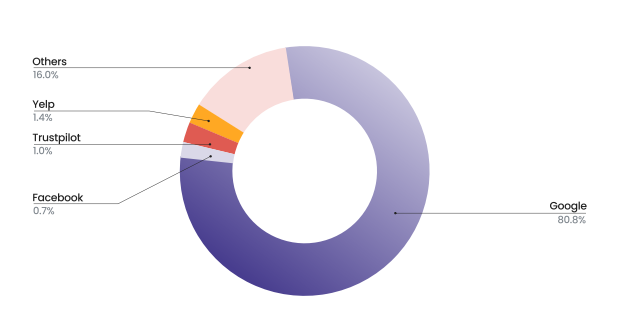
While Google maintains overall dominance, its influence varies significantly by industry:
- Retail: 90.2% of reviews
- Automotive: 86.4% of reviews
- Finance: Only 49.7% of reviews (with Facebook capturing 28.7%)
For businesses, this means prioritizing Google Business Profile optimization is non-negotiable, but industry-specific platforms still matter, especially in sectors like finance, hospitality, and real estate, where specialized review sites provide targeted feedback.
Review Generation Strategies: What’s Working in 2025
Businesses Increase Review Request Efforts
In 2024, businesses sent 25% more review requests compared to 2023, reflecting the growing recognition that a strong review presence directly impacts visibility, credibility, and customer trust.
The data shows review requests have consistently increased year over year:
- 2020: 8% growth
- 2021: 18% growth
- 2022: 5% growth
- 2023: 5% growth
- 2024: 13% growth
Email vs. SMS: The Channel Battle Continues
Email remains the preferred channel for review requests, accounting for 60% of all solicitations. This preference stems from email’s lower cost, ease of automation, and ability to include personalized branding elements.
However, the engagement statistics tell a more nuanced story:
- SMS review requests achieve a 38% engagement rate
- Email review requests average a 27% engagement rate
While SMS delivers higher engagement, there’s a concerning trend: SMS click-through rates fell from 8% in 2023 to 6% in 2024. This decline coincides with the rise of SMS spam—Americans received approximately 19.2 billion spam texts in February 2025 alone, an average of 63 per person. Additionally, AI-powered scams have made fraudulent messages more sophisticated, with a 135% increase in “novel social engineering” attacks since the release of ChatGPT.
The Multi-Touch Imperative
Getting customers to leave a review requires more persistence than ever, with businesses increasing their follow-up efforts by 9% in 2024. This trend highlights a growing challenge: while customers rely heavily on reviews, they need more prompting before taking action.
Several factors contribute to this hesitation:
- Increasing review fatigue: With businesses across industries requesting feedback, customers become more selective about where they share opinions
- Attention competition: Overflowing inboxes and notification overload mean review requests easily get buried
- Trust concerns: Rising spam and scams make consumers more cautious about clicking links
Industry data reveals interesting patterns in follow-up requirements. Businesses in beauty & wellness, finance, and real estate send more reminder emails than initial requests, indicating customers in these sectors require more touchpoints before taking action.
Review Response: The Business Engagement Revolution
Businesses Prioritize Review Management
In 2024, businesses dramatically increased their review response efforts, with response rates growing by 15% (from 63% in 2023 to 73% in 2024). This shift reflects growing awareness that responding to reviews improves:
- Customer loyalty and retention
- Search engine visibility and local SEO performance
- New customer acquisition through enhanced trust signals
The historical data shows how dramatically this aspect of reputation management has evolved:
- 2020: 23% response rate
- 2021: 21% response rate
- 2022: 54% response rate
- 2023: 63% response rate
- 2024: 73% response rate
Balancing Automation with Personalization
While many businesses leverage technology to manage increasing review volumes, the data shows a slight shift toward more personalized engagement. Manual responses increased from 58% to 61% in 2024, while automated responses declined from 42% to 39%.
This trend varies significantly by industry:
- Home Services leads in manual responses (77%)
- Healthcare (52%) and Retail (56%) favor personalized approaches
- Finance (65%), Hospitality (66%), Legal (71%), and Real Estate (71%) rely more heavily on automation
The reasons for these differences include:
- Personalization requirements: Industries with complex customer concerns (healthcare, retail) benefit more from tailored human responses
- Volume management: High-review-volume industries leverage automation to maintain timely responses
- Regulatory considerations: Healthcare providers must comply with HIPAA and other privacy regulations, making human oversight essential
The Quality Factor: Review Content Trends
Comments Add Context and Value
Reviews with detailed comments increased from 79% to 81% in 2024, continuing a positive trend in feedback quality. This shift benefits both businesses and consumers:
- For businesses: Detailed feedback provides actionable insights for improvement
- For consumers: Contextual information helps make more informed purchasing decisions
The trend toward more detailed reviews represents a significant improvement from earlier years:
- 2020: 72% with comments
- 2021: 71% with comments
- 2022: 73% with comments
- 2023: 79% with comments
- 2024: 81% with comments
Review Length Stabilizes
After years of declining review length as mobile-first consumers provided shorter feedback, the average character count has stabilized. In 2024, the average review length was 249 characters, virtually unchanged from 245 characters in 2023.
Review length varies significantly by industry, with real estate, hospitality, and beauty & wellness receiving the most detailed feedback. This reflects the complex, personal nature of these services and the significant financial and emotional investment consumers make in these sectors.
Strategic Implications for Your Business
The 2025 online review statistics present clear strategic imperatives for businesses looking to strengthen their online reputation:
- Prioritize Google Business Profile optimization while maintaining visibility on industry-specific platforms relevant to your sector
- Implement a multi-channel review request strategy that balances email and SMS, recognizing the strengths and limitations of each
- Increase follow-up communications without overwhelming customers, especially in industries where multiple touchpoints are needed
- Respond to all reviews promptly, using a mix of personalized responses for complex feedback and efficient automation for straightforward reviews
- Encourage detailed feedback by asking specific questions in review requests that prompt customers to share their experiences
- Monitor review trends by platform to identify where your customers are most engaged and adjust your strategy accordingly
- Leverage AI-powered tools responsibly to enhance efficiency without sacrificing the human touch that builds lasting relationships
Industry-Specific Insights
Healthcare
With 81% of patients checking reviews before choosing a provider, healthcare businesses must prioritize reputation management.
Beyond Google (79.7% of healthcare reviews), platforms like Healthgrades (1.2%) and WebMD play crucial roles in patient decision-making.
Healthcare providers face unique challenges in review management, including:
- HIPAA compliance concerns when responding to reviews
- Higher expectations for personalized responses (52% of responses are manual)
- Longer decision cycles require the strategic timing of review requests
Automotive
The automotive industry sees 86.4% of reviews on Google, with specialized platforms like DealerRater (1.5%), Carfax (1.5%), and Carwise (0.9%) also influencing buyer decisions. With car purchases representing significant investments, detailed reviews heavily impact consumer choice.
Automotive businesses should focus on:
- Encouraging reviews that highlight customer service quality
- Responding quickly to negative feedback, as 71% of consumers say their perception of a business improves when it responds to reviews
- Maintaining visibility across industry-specific platforms where serious buyers research
Retail
With 90.2% of retail reviews on Google, the platform’s dominance is strongest in this sector. For retailers, online reviews directly impact conversion rates—93% of shoppers read reviews before making a purchase.
Retail businesses should prioritize:
- Encouraging reviews that discuss product quality and customer service
- Leveraging social proof in marketing materials
- Monitoring review trends to identify product issues early
FAQs
Q: What are the general online review statistics for 2025?
A: As of 2025, online reviews have become essential for businesses, with 90% of consumers stating that they read reviews before making a purchase. Additionally, 70% of customers only trust businesses with a minimum of four stars, highlighting the importance of maintaining a positive online reputation.
Q: How can local businesses improve their reputation management?
A: Local businesses can improve their reputation management by actively engaging with customers, responding to reviews, both positive and negative, and encouraging satisfied customers to leave positive online reviews on major review sites like Google and Yelp.
Q: What impact do negative reviews have on a business?
A: Negative reviews can significantly impact a business, as they can deter potential customers and diminish trust. Studies show that a single negative review can lead to a loss of 22% of potential customers, making it crucial for businesses to address and manage negative feedback effectively.
Q: What are some popular online review platforms for businesses?
A: Some popular online review platforms include Google Reviews, Yelp, Facebook, and TripAdvisor. These platforms allow customers to share their experiences and provide businesses with valuable feedback.
Q: How can businesses manage fake reviews?
A: Businesses can manage fake reviews by monitoring their online presence regularly, reporting suspicious reviews to the review platform, and encouraging genuine customers to leave their feedback, which can help dilute the impact of fake reviews.
Q: Why are customer reviews as much personal as they are professional?
A: Customer reviews are as much personal as they are professional because they reflect individual experiences and emotions. This personal touch often resonates with other consumers, influencing their buying decisions and shaping a business’s online reputation.
Q: What are the benefits of responding to reviews?
A: Responding to reviews can enhance a business’s online reputation, show customers that their feedback is valued, and improve customer loyalty. It also provides an opportunity to address concerns raised in negative reviews, potentially converting dissatisfied customers into repeat clients.
Q: How does the volume of reviews affect a business’s reputation?
A: The volume of reviews can significantly affect a business’s reputation. A higher number of reviews generally increases credibility and trust among potential customers, while a lower volume may suggest a lack of customer engagement or satisfaction.
Q: What should businesses do if they receive unsolicited online hotel reviews?
A: If a business receives unsolicited online hotel reviews, it should respond professionally and politely, thanking the reviewer for their feedback. If the review is fake or violates platform guidelines, the business can report it to the review site for investigation.
Q: How can businesses use online reviews to enhance their marketing strategies?
A: Businesses can use online reviews to enhance their marketing strategies by showcasing positive reviews in their advertising, creating testimonials for their website, and using customer feedback to improve products and services, thereby attracting more online shoppers.
Conclusion: The Future of Online Reviews
The 2025 online review statistics paint a clear picture: reviews are more influential than ever in consumer decision-making, and businesses that excel at generating, managing, and leveraging customer feedback gain a significant competitive advantage.
As review volumes continue to climb and consumer expectations evolve, successful businesses will:
- Adapt to changing platform dynamics, particularly Google’s growing dominance
- Refine multi-channel review generation strategies to overcome increasing consumer hesitation
- Balance automation with personalization in review responses
- Extract actionable insights from detailed review content to drive continuous improvement
In today’s digital marketplace, your online reputation isn’t just one aspect of your business—it’s increasingly becoming your business in the eyes of potential customers. The businesses that thrive will be those that recognize this shift and invest accordingly in comprehensive review management strategies.
Take Control of Your Online Reputation Today
Ready to transform how your business handles online reviews? Review Dingo’s AI-powered reputation management platform helps you generate more positive reviews, respond efficiently to customer feedback, and leverage reviews to drive growth.
Our comprehensive solution provides:
- Automated review requests via email and SMS
- AI-powered review response tools that balance efficiency with personalization
- Detailed analytics to track your performance across all review platforms
- Competitive benchmarking to see how you stack up against others in your industry
Start your risk-free 7-day trial today and discover why 150,000+ businesses trust Review Dingo’s platform to manage their most valuable asset—their online reputation.

